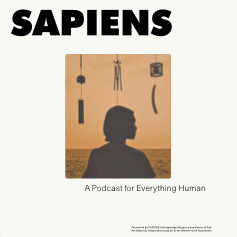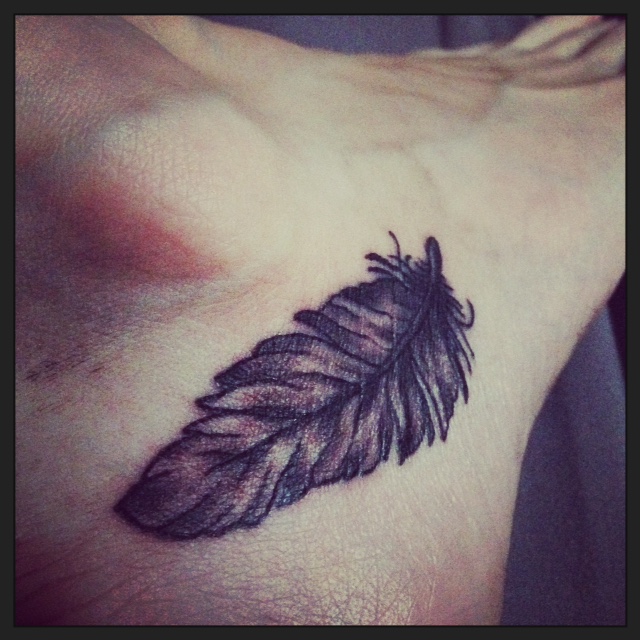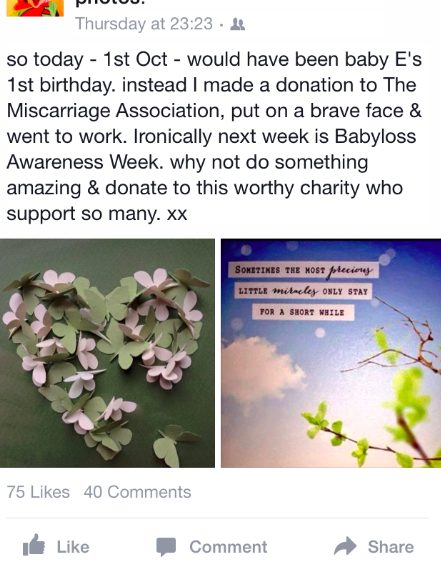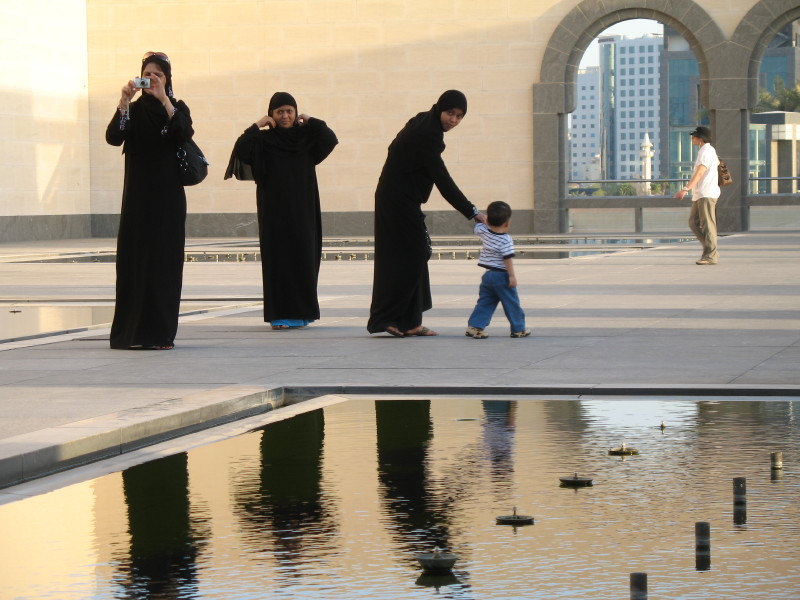How Culture Shapes Perceptions of Miscarriage
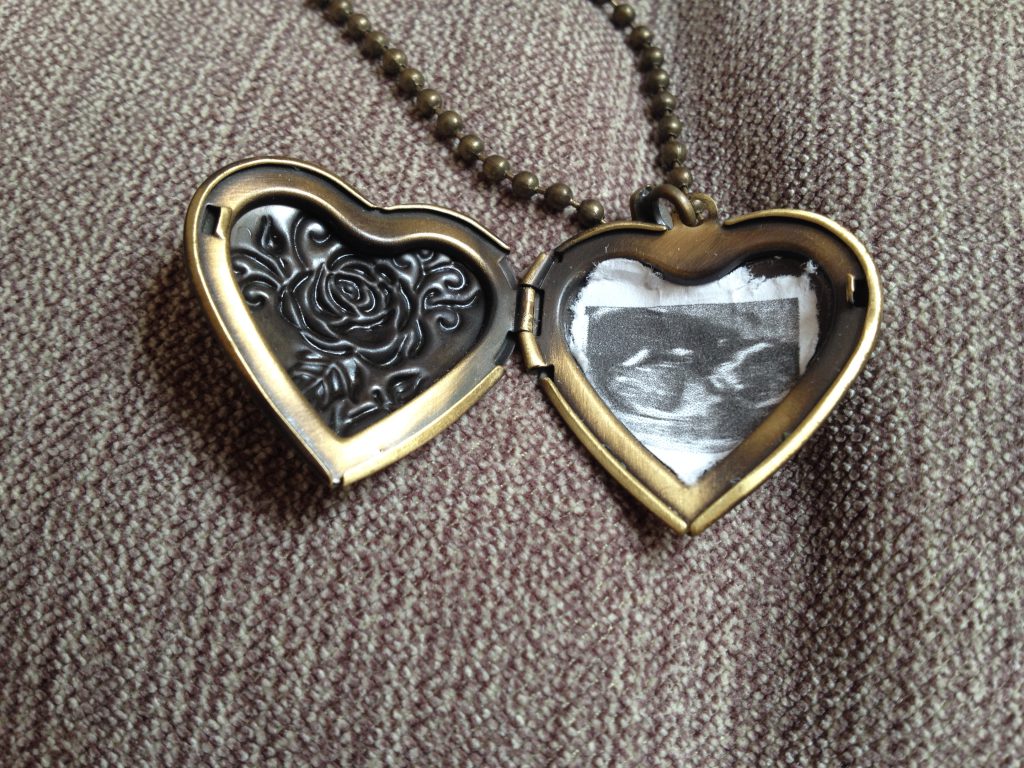
Charlotte’s tattoo, a black etching of a feather, is strikingly beautiful—but it also evokes sadness. [1] [1] All names in this piece, except for the author’s, are pseudonyms. She got it as a reminder of her devastating miscarriage, when she lost a baby seven weeks into her pregnancy. The idea for the tattoo came after she was picnicking with her sister and niece, she told me. “I had a very strong sense of the baby, like my sister and I were in the park with our babies as life should be. A little while later a feather went by,” she explained. When she Googled the symbolism of feathers, she found something about how the bird once needed the feather but now flies on without it. “I sort of feel like it’s important to be okay with feeling attached to things I can’t touch, hold … and for the feeling to be enough.”
The tattoo is below Charlotte’s ankle. Its visibility is important to her; she wants her loss to be public. She isn’t alone. Many British women say their miscarriages were met with silence or discomfort from others, and they want to share their experiences to combat this cultural tendency. By expressing themselves through talking about their miscarriages, posting on social media, wearing symbolic jewelry or clothing, and marking their bodies, they demonstrate to those around them that they have lost something meaningful. For Charlotte, her tattoo is a way of showing the world that her baby is “part of me, and that he/she is with me every day.”
Like Charlotte, my first pregnancy ended in miscarriage. I was in my 30s and had recently completed a doctorate in social anthropology, and my husband had secured his first job as a pilot. We thought it was a good time to have a baby. Following British convention, I did not tell anyone about my pregnancy during the first trimester. My husband and I arrived at our hospital appointment for my first scan, at 13 weeks, feeling happy and excited. The light-hearted atmosphere quickly changed when the sonographer said, “I’m so sorry, there is a baby there, but there is no heartbeat.” I was shocked. I had no idea that a miscarriage could happen so quietly, without bleeding or pain. Instead of going home clutching pictures of our baby, we left the hospital with instructions on how to shed its dead body. I opted for a surgical procedure and tried to put the miscarriage behind me, but I couldn’t. I was devastated, but very few people even knew I had been pregnant. My miscarriage was a major life event but a private one that left me feeling vulnerable and isolated. The cultural silence around miscarriage meant that I, like so many women, had no idea that 1 in 4 pregnancies end this way.
Today, conversations around miscarriage in the U.K. are opening up thanks to people like Charlotte. Pregnancy loss support groups and other organizations, such as the Miscarriage Association and the Mumsnet Miscarriage Care Campaign, have been instrumental in changing public and medical perspectives on pregnancy loss. There has been a move toward treating miscarriage as a significant loss, and the medical profession has responded by modifying their approach to miscarriage and treating it with greater sensitivity. Nonviable embryos and fetuses were previously discarded as medical waste; women are now offered choices about disposal, along with funerals or other types of ceremonies that recognize the loss.
But while the silence surrounding miscarriage is finally being broken in the U.K., only certain voices are coming through. The dominant narrative that has emerged views miscarriage as the loss of a valued and treasured being that results in grief and trauma. Thus the experience of miscarriage is expected to involve mourning and recovery. But not all women react that way—some are quite pragmatic. And in some parts of the world miscarriage is not necessarily seen as traumatic. Years after my first experience with miscarriage, I found myself in a hospital in Qatar losing a third baby. In Qatar, I discovered, the technologies around health and birth are similar to those in the U.K., but women’s experiences of pregnancy and miscarriage are very different.
The contrasting experiences of my miscarriages spurred me to explore this subject formally as part of a four-year anthropological study in the two countries I have called home—the U.K. and Qatar. My assistants and I spoke with 100 women in Qatar and the U.K. about their losses.
The stories I heard from British women spoke to their general anxiety that something was wrong with them and their pessimism about their chances of having a subsequent successful pregnancy. They talked about their bodies failing them, and them failing their loved ones, by not “hanging on” to the baby. They worried about their age and were concerned that they had waited too long to start a family. Most were like Ashley, 37, who suffered two first-term miscarriages and was convinced that it would happen again.
Most of the British women talked about losing “dreams” and an imagined life. As a hopeful mother named Alison said, “I was really, really upset, and, obviously, I’d imagined a whole future for that baby, and they’ve told you all your dates, and everything, when to expect everything, and that’s now just not happening.”
Martha was 42 and desperately hoped for a sibling for her 3-year-old son. She had a high-powered and successful career in media, but after her son was born, she surprised herself by not wanting to go back to work. She decided to establish a different kind of life—one that would allow her to focus on her son and have more children. Instead she had two miscarriages, and her sadness grew deeper, as did her anxiety. “I’d made the decision not to return to work, and I was really wanting another child and my whole life was kind of around trying to make this work.” She was still upset and vulnerable when speaking about it all, despite the fact that she was 12 weeks pregnant when I spoke with her.
Although some women in the U.K. are talking more openly about how devastating miscarriage can be, others feel that doing so is unnecessary. Mary was uncomfortable about the handling of her miscarriage at 20 weeks: The nurse kept referring to her “baby” and suggested a “funeral.” She told me, “I felt like a weird mother that doesn’t care. You know, ‘There was a service for your baby and you didn’t go?!’ … I wouldn’t have thought about having any type of funeral or anything like that. It just felt really over the top and weird.” A mother of four, she was sad for the loss but was pragmatic and did not frame it as the loss of a child or baby.
The Qatari women we met were sad following a miscarriage, but in many cases, they were practical and did not dwell on the loss. The issue of miscarriage was not silenced in Qatar like it historically has been in the U.K.—most women knew of others who had miscarried. Reproduction is a central aspect of women’s role in Qatar: Women are expected to have large families—and often have a desire for them—and, thus, many of them experience multiple pregnancies. This means that there is more exposure to pregnancy complications and loss; miscarriage is perceived as a relatively normal and common event. As another woman in my study, Jameela, said matter-of-factly: “I saw that lots of women miscarried this month. Also, my sister, just yesterday, she miscarried. The [baby’s] heartbeat stopped.”
Fareeda, a 38-year-old teacher in Qatar who had six children after 10 pregnancies, was in the midst of her fourth miscarriage when we met her in the hospital in 2014. Having reached the 12th week of her pregnancy, she had learned that the baby she was carrying was a much-wanted boy: Her desire to add another male to the family had driven her to become pregnant again, as had her husband’s wishes to have more children. With five daughters and one son, she was eager to produce a brother and companion for her son.
When faced with such losses, Qatari women are generally comforted by their strong faith. Women, their families, and doctors and nurses all talk about lost babies as “birds in heaven” who their mothers will see again and who will help their mothers enter paradise. As Fareeda said, “When I tell [the doctors] I had four miscarriages they say, ‘You are lucky, there is someone who will protect you in the Judgment Day.’ I told them my first miscarriage was about 40 days only. They say ‘in heaven this bird will come along and hold your hand and say to God, “This was my mother.’” … It should be this way because we are suffering a lot in miscarriage. … It relieves the pain, alhamdulillah [praise God].”
Qatari women view their miscarriages as being God’s will and part of God’s plan. Another woman, Kholoud, explained: “You don’t know what your child will grow up to be: He may grow up to be disabled or a corrupted person or disobedient, or he may kill his parents. So Allah didn’t want him to be born because he wants the best for you. We believe in this, and this is why we stay strong when we have such experiences.”
The main difference between the stories of loss we heard in the U.K. and those we listened to in Qatar seemed to revolve around perceptions of agency and control. The British women we spoke to waited until later in life to get pregnant and were used to managing their careers and lives to a fine-tuned degree. Most of our interviewees were in their 30s and had decided to get married as a preface to family life, with the intention of having a baby as soon as possible after the wedding. Most planned their pregnancies and prepared their bodies by taking vitamins, exercising, limiting their alcohol intake, and using various tools to chart and map their fertility. They often had named their babies and thought of them as children by an early stage of pregnancy. The sense of loss in the wake of a miscarriage was as much about losing control and an envisioned future as about the death of the baby.
In Qatar, where faith is pervasive, the women we spoke with often felt that things were in God’s hands rather than their own. Control had already been ceded, and the grief was often less intense compared to what most of our U.K. interviewees experienced. Although birth control is available, women saw pregnancy as the expected outcome of sex with their husbands, and miscarriage as part of the normal experience of a woman’s reproductive journey.
After my first miscarriage 10 years ago, I felt isolated, devastated, and unable to access a framework that would help me make sense of the experience. But each time I had a miscarriage I responded differently. For me, the ultimate lesson I learned from my pregnancies and miscarriages was that I would have to relinquish a sense of control over my life—a message that became even more significant after I had two healthy daughters. If there’s one thing a baby teaches us—whether through a miscarriage or a full-term delivery—it is that we are no longer in charge.
A vast range of responses—from intense grief to a practical shrug, from silence to openness, from sadness to acceptance—are all normal reactions, depending on personal experiences and cultural contexts. But while there are a variety of ways to respond to and process miscarriage, one thing is certain: Women everywhere can benefit from hearing one another’s stories.































